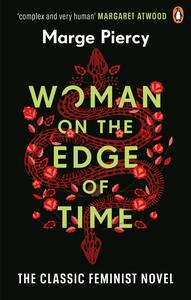Take a photo of a barcode or cover
La verdad es que en un primer momento me gustó el tono que tenía la novela pero a medida que he ido leyendo he perdido el interés. El libro en sí está bien pero creo que el final no ha sido lo que me esperaba para un libro tan crudo.
I’ve read a fair few women’s utopias recently and this similarity struck me often as I read this book. A common view in these utopias seems to be that we, globally, are careening toward disaster, and after the disaster those who are left will learn from our mistakes in what they rebuild—and what they leave out. The society here is one that I have a hard time imagining ever coming to be, but there’s so much good to learn from it. I hope we can learn.
And why is it that these anarchist, nature-oriented, power-tearing-down visions are women’s visions?
“Suddenly she thought that these men believed feeling itself a disease, something to be cut out like a rotten appendix. Cold, calculating, ambitious, believing themselves rational and superior, they chased the crouching female animal through the brain with a scalpel.”
I didn’t enjoy having to read Connie imprisoned but it did serve a powerful message. Also an absolute banger of an ending.
This reminded me of One Flew Over the Cuckoo’s Nest, but fleshed out in a way I could have never imagined. The ideas of racism, sexism, classism, and the patriarchy of our current world (even if it was based in the 1970s) were so strongly contrasted against this utopian future that there was absolutely no subtlety, and I love that. This book may have been written in the 70s, but it was way ahead of its time. There was so much social consciousness of us as humans, the hierarchies we unfortunately uphold, and the future of this planet, that I genuinely double-checked when this was written. There were even neo-pronouns!
Connie was a character that grew and developed in extraordinary ways, and I wish more people could grow to understand the power struggles people face in day-to-day life.
I truly love this book, and, while I have qualms about the author writing from this particular point of view, I know I don’t have the right to judge on that aspect as it’s not something I have experienced. But I have experienced being AFAB, queer, and mental illness, and the way this book spoke to me on these aspects will probably stick with me.
Graphic: Ableism, Addiction, Alcoholism, Body shaming, Bullying, Child abuse, Death, Domestic abuse, Drug abuse, Drug use, Emotional abuse, Fatphobia, Hate crime, Infertility, Mental illness, Misogyny, Physical abuse, Racial slurs, Racism, Rape, Sexism, Sexual content, Suicide, Toxic relationship, Violence, Forced institutionalization, Xenophobia, Medical content, Grief, Medical trauma, Abortion, Murder, Schizophrenia/Psychosis , Lesbophobia, Gaslighting, Toxic friendship, War, Injury/Injury detail, Classism
Graphic: Domestic abuse, Medical trauma
Minor: Abortion
The relevance of this book to me in 2024 was thoroughly different. I still found solace, beauty, and joy in the vision of the future it holds. But the omnipresence of Connie's life in the present, and the constant threat of the return of that violence as a pervasive motivation for the future to be organized as it is, held much more power for me. The keen awareness that Connie was never as free as she felt when visiting the future, and that at some point this would come to a head as doctors became entitled to her body and mind, never slipped away. The 2016 audio edition contains a forward which points to the difference between the hopeful, winning, world-changing feminism of the 70s and the nihilistic feminism-on-the-back-foot of today. Hell, some "feminists" today might decry the use of neopronouns in a gender-essentialist, hierarchy-reinforcing twisting of the power relations which steal our selves and equality from us. I find the knowledge of this possibility contained within the original text a telling sign of our responsibility to make the choice that Connie makes at the end of the book.
I'm sure that I will come back to this book again and reflect on something new in it. I was actually reminded to read it when it came us in The Future is Disabled as an example of a book which does not flinch from madness, but which genetically eliminates physical disabilities. Discussions of race, economic relations, sexual violence, and conflict resolution also all have a touch point in this book, and I know I'll be seeking out the perspectives of many others as I move forward from it. It's dearly beloved to me and I highly recommend placing yourself and your current world between Connie and 2137.
Graphic: Ableism, Domestic abuse, Emotional abuse, Physical abuse, Sexism, Forced institutionalization, Medical trauma
Moderate: Child abuse, Racism, Sexual violence, Schizophrenia/Psychosis
Minor: Drug use, Rape, War



